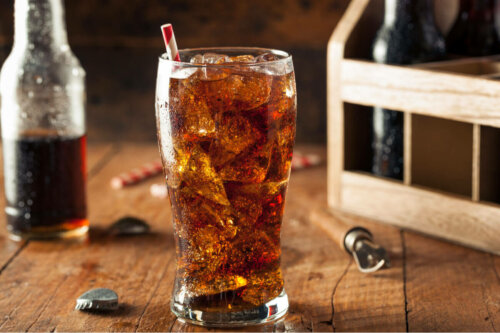Effects of Fast Food After Training

Knowing that fast food is unhealthy is nothing new. It contains substances that interfere with the functioning of the body’s physiological systems, which can lead to complex and metabolic diseases in the medium and long term. Read this article to discover the effects of consuming fast food after training.
On the other hand, eating this type of food after training can condition your recovery capacity. Inefficient or incomplete nutrition is capable of increasing the risk of injury in training or in subsequent competitions, in addition to hindering the muscular adaptations responsible for increasing sports performance.
Fast food doesn’t have many nutrients
Fast food is characterized by being high in energy, but low in nutrients. It hardly contains quality proteins, and these nutrients are extremely important to ensure your recovery.
According to research published in the European Journal of Applied Physiology, after aerobic or anaerobic effort, it’s important to ensure protein intake to improve recovery capacity and muscle tissue adaptations.
However, the foods that make up fast food usually don’t have the necessary amount of protein to complete your daily intake and improve the repair of damaged muscle. Experts recommend an intake of up to two grams of this nutrient per kilogram of muscle weight in the athlete. It’s unlikely that an industrial pizza will adequately meet this requirement per serving.

Consuming fast food after training: trans fats are another problem
Another factor that negatively affects the quality of fast food is its trans fat content. These lipids have inflammatory activity, so they’re completely contraindicated after intense physical exertion, in which your priority should be to reduce inflammation.
A study published in the journal Progress in Lipid Research corroborates the ability of these fatty acids to stimulate inflammation in the body. This situation negatively conditions the recovery capacity of muscle tissue and increases the risk of subsequent injury.
For this reason, it’s important to restrict your fast food intake after intense exercise. In fact, it’s a time when your body needs quality nutrients.
Antioxidants are better after exercise
Once your intense exercise is over, your body needs a supply of phytonutrients and antioxidants that regulate oxidation and reduce the production of free radicals. Eating fast food after training doesn’t satisfy these nutritional needs. This is another reason why you should avoid fast food after exercise.
Instead, we recommend you eat fruits and vegetables, which have phytochemicals capable of reducing cell damage and can improve your recovery capacity. At the same time, you can also eat foods rich in carbohydrates, but you should make sure these have a low glycemic index and are high quality; tubers are an ideal option.
Finally, you need to eat high biological value proteins from meat, fish, or eggs. Fast food, however, is made with excessively refined flours, poor quality processed meat derivatives, and sauces that increase energy value without containing high-value nutrients.

Avoid fast food after training
In short, it’s best to avoid fast food in any situation. This advice is even more important when we talk about eating this type of food after training.
As we mentioned, eating products made from refined flours and trans fats can negatively affect your recovery capacity. This, in turn, increases the risk of injury in subsequent training sessions.
To ensure good recovery, you should eat quality nutrients. Post-workout food should contain enough high biological value proteins, complex carbohydrates that refill your glycogen and phytonutrient stores. Otherwise, your health will be negatively affected.
Finally, remember that it’s also important to avoid sodas rich in sugars, low-quality carbohydrates, and additives after training. You should establish a rehydration guideline, based mainly on the intake of mineral water.
Knowing that fast food is unhealthy is nothing new. It contains substances that interfere with the functioning of the body’s physiological systems, which can lead to complex and metabolic diseases in the medium and long term. Read this article to discover the effects of consuming fast food after training.
On the other hand, eating this type of food after training can condition your recovery capacity. Inefficient or incomplete nutrition is capable of increasing the risk of injury in training or in subsequent competitions, in addition to hindering the muscular adaptations responsible for increasing sports performance.
Fast food doesn’t have many nutrients
Fast food is characterized by being high in energy, but low in nutrients. It hardly contains quality proteins, and these nutrients are extremely important to ensure your recovery.
According to research published in the European Journal of Applied Physiology, after aerobic or anaerobic effort, it’s important to ensure protein intake to improve recovery capacity and muscle tissue adaptations.
However, the foods that make up fast food usually don’t have the necessary amount of protein to complete your daily intake and improve the repair of damaged muscle. Experts recommend an intake of up to two grams of this nutrient per kilogram of muscle weight in the athlete. It’s unlikely that an industrial pizza will adequately meet this requirement per serving.

Consuming fast food after training: trans fats are another problem
Another factor that negatively affects the quality of fast food is its trans fat content. These lipids have inflammatory activity, so they’re completely contraindicated after intense physical exertion, in which your priority should be to reduce inflammation.
A study published in the journal Progress in Lipid Research corroborates the ability of these fatty acids to stimulate inflammation in the body. This situation negatively conditions the recovery capacity of muscle tissue and increases the risk of subsequent injury.
For this reason, it’s important to restrict your fast food intake after intense exercise. In fact, it’s a time when your body needs quality nutrients.
Antioxidants are better after exercise
Once your intense exercise is over, your body needs a supply of phytonutrients and antioxidants that regulate oxidation and reduce the production of free radicals. Eating fast food after training doesn’t satisfy these nutritional needs. This is another reason why you should avoid fast food after exercise.
Instead, we recommend you eat fruits and vegetables, which have phytochemicals capable of reducing cell damage and can improve your recovery capacity. At the same time, you can also eat foods rich in carbohydrates, but you should make sure these have a low glycemic index and are high quality; tubers are an ideal option.
Finally, you need to eat high biological value proteins from meat, fish, or eggs. Fast food, however, is made with excessively refined flours, poor quality processed meat derivatives, and sauces that increase energy value without containing high-value nutrients.

Avoid fast food after training
In short, it’s best to avoid fast food in any situation. This advice is even more important when we talk about eating this type of food after training.
As we mentioned, eating products made from refined flours and trans fats can negatively affect your recovery capacity. This, in turn, increases the risk of injury in subsequent training sessions.
To ensure good recovery, you should eat quality nutrients. Post-workout food should contain enough high biological value proteins, complex carbohydrates that refill your glycogen and phytonutrient stores. Otherwise, your health will be negatively affected.
Finally, remember that it’s also important to avoid sodas rich in sugars, low-quality carbohydrates, and additives after training. You should establish a rehydration guideline, based mainly on the intake of mineral water.
All cited sources were thoroughly reviewed by our team to ensure their quality, reliability, currency, and validity. The bibliography of this article was considered reliable and of academic or scientific accuracy.
- Rindom E., Nielsen MH., Keeci K., Jensen ME., et al., Effect of protein quality on recovery after intense resistance training. Eur J Appl Physiol, 2016. 116: 2225-2236.
- Valenzuela CA., Baker EJ., Miles EA., Calder PC., Eighteen carbon trans fatty acids and inflammation in the context of atherosclerosis. Prog Lipid Res, 2019.
This text is provided for informational purposes only and does not replace consultation with a professional. If in doubt, consult your specialist.








